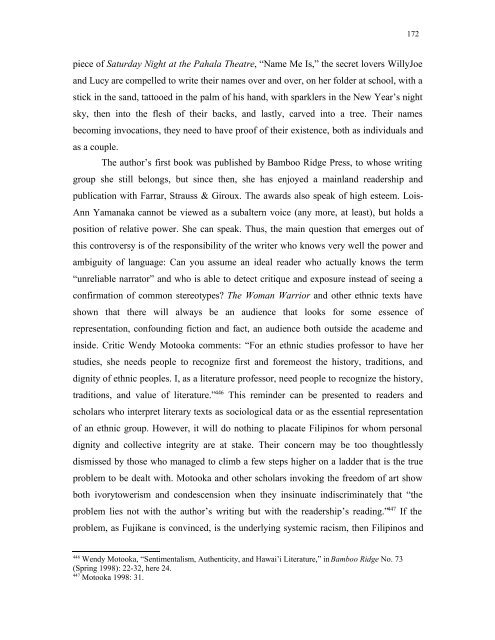A Paradise Lost - KOPS - Universität Konstanz
A Paradise Lost - KOPS - Universität Konstanz
A Paradise Lost - KOPS - Universität Konstanz
You also want an ePaper? Increase the reach of your titles
YUMPU automatically turns print PDFs into web optimized ePapers that Google loves.
piece of Saturday Night at the Pahala Theatre, “Name Me Is,” the secret lovers WillyJoe<br />
and Lucy are compelled to write their names over and over, on her folder at school, with a<br />
stick in the sand, tattooed in the palm of his hand, with sparklers in the New Year’s night<br />
sky, then into the flesh of their backs, and lastly, carved into a tree. Their names<br />
becoming invocations, they need to have proof of their existence, both as individuals and<br />
as a couple.<br />
The author’s first book was published by Bamboo Ridge Press, to whose writing<br />
group she still belongs, but since then, she has enjoyed a mainland readership and<br />
publication with Farrar, Strauss & Giroux. The awards also speak of high esteem. Lois-<br />
Ann Yamanaka cannot be viewed as a subaltern voice (any more, at least), but holds a<br />
position of relative power. She can speak. Thus, the main question that emerges out of<br />
this controversy is of the responsibility of the writer who knows very well the power and<br />
ambiguity of language: Can you assume an ideal reader who actually knows the term<br />
“unreliable narrator” and who is able to detect critique and exposure instead of seeing a<br />
confirmation of common stereotypes? The Woman Warrior and other ethnic texts have<br />
shown that there will always be an audience that looks for some essence of<br />
representation, confounding fiction and fact, an audience both outside the academe and<br />
inside. Critic Wendy Motooka comments: “For an ethnic studies professor to have her<br />
studies, she needs people to recognize first and foremeost the history, traditions, and<br />
dignity of ethnic peoples. I, as a literature professor, need people to recognize the history,<br />
traditions, and value of literature.” 446 This reminder can be presented to readers and<br />
scholars who interpret literary texts as sociological data or as the essential representation<br />
of an ethnic group. However, it will do nothing to placate Filipinos for whom personal<br />
dignity and collective integrity are at stake. Their concern may be too thoughtlessly<br />
dismissed by those who managed to climb a few steps higher on a ladder that is the true<br />
problem to be dealt with. Motooka and other scholars invoking the freedom of art show<br />
both ivorytowerism and condescension when they insinuate indiscriminately that “the<br />
problem lies not with the author’s writing but with the readership’s reading.” 447 If the<br />
problem, as Fujikane is convinced, is the underlying systemic racism, then Filipinos and<br />
446 Wendy Motooka, “Sentimentalism, Authenticity, and Hawai’i Literature,” in Bamboo Ridge No. 73<br />
(Spring 1998): 22-32, here 24.<br />
447 Motooka 1998: 31.<br />
172

















